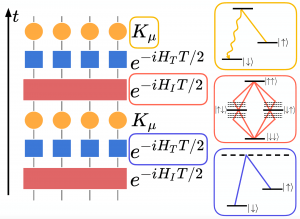
Understanding how entanglement propagates in quantum systems, and which tools can be employed to govern its dynamics, are not only fundamental questions for advancing our comprehension of the deeper structure of nature, but represent crucial steps towards building reliable and scalable quantum processors where entanglement can be tailored and protected. The main challenge in creating and protecting entanglement is posed by another puzzling feature of quantum mechanics, namely decoherence: a quantum system “measured” by the environment loses its quantum correlations and is projected into classical states [1]. Errors caused by environmental noise can be modeled as non-unitary operations acting on the qubits. These errors can be overcome by using quantum error correction, which also employs entanglement between the quantum register and ancilla qubits that are locally measured without destroying quantum coherence. Therefore the system will have to be partially open to the outside world to extract information about the register preserving its quantum coherence.
In this line of research we aim to engineer local non-unitary operations, such as reset and measurement, on a chain of trapped ions. This setting will be used in order to study non-equilibrium dynamics of open quantum many-body systems and investigate the competition between unitary and non-unitary evolution. In particular we aim to observe a non-equilibrium dissipative phase transition, theoretically investigated in [2].
References:
[1] W. H. Zurek. Decoherence, einselection, and the quantum origins of the classical. Rev. Mod. Phys. 75, 715–775 (2003).
[2] P. Sierant et al., Quantum 6, 638 (2022).

